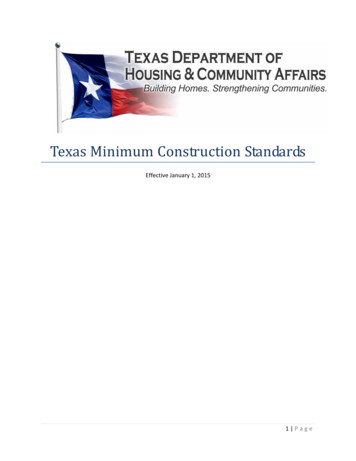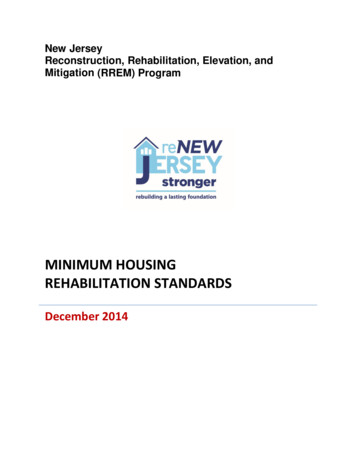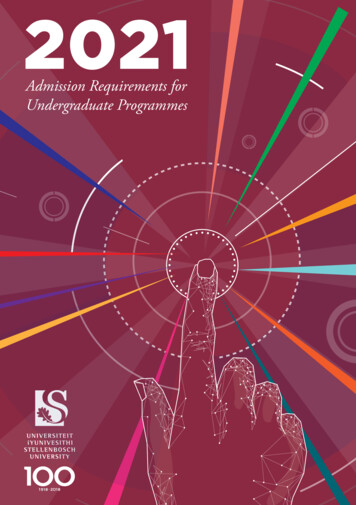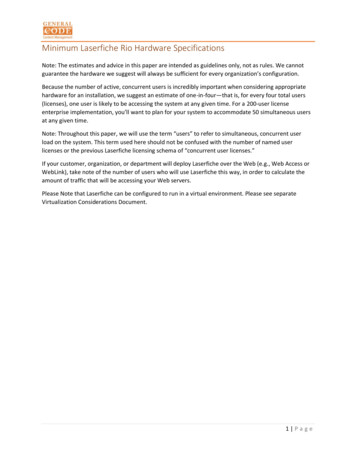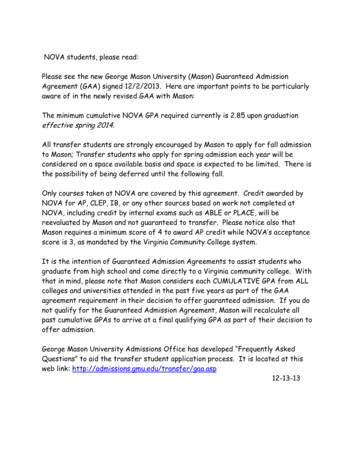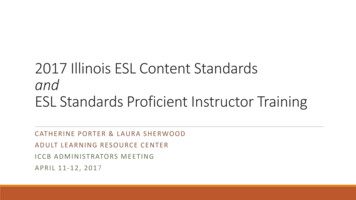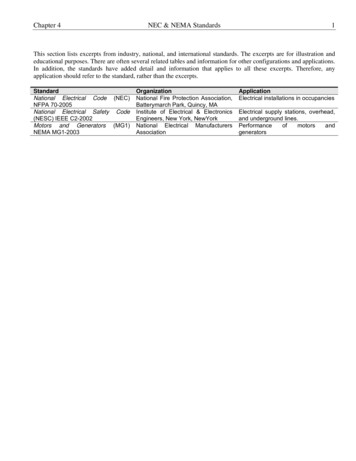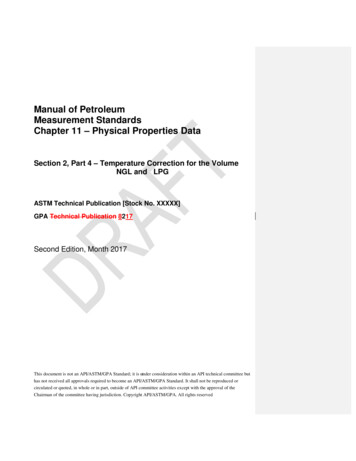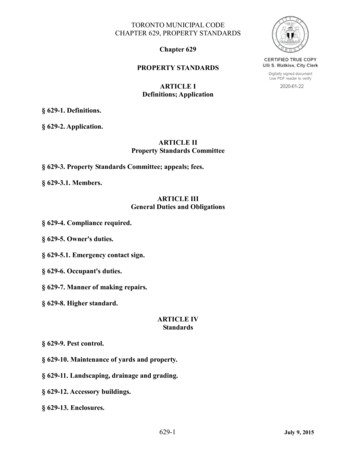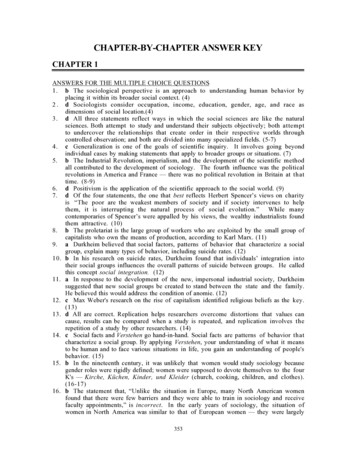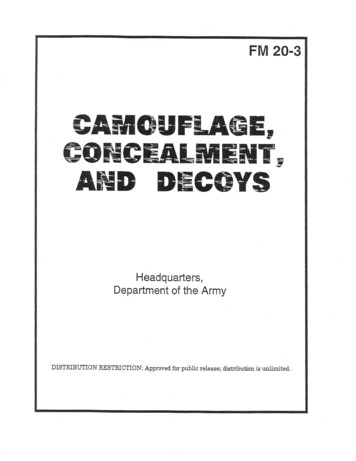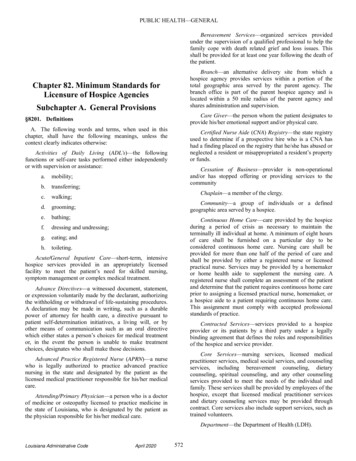
Transcription
PUBLIC HEALTH—GENERALBereavement Services—organized services providedunder the supervision of a qualified professional to help thefamily cope with death related grief and loss issues. Thisshall be provided for at least one year following the death ofthe patient.6. be open for the business of providing CRCCservices to those who need assistance.AUTHORITY NOTE: Promulgated in accordance with R.S.40:2175.14(B).HISTORICAL NOTE: Promulgated by the Department ofHealth and Hospitals, Office of the Secretary, Bureau of HealthServices Financing, LR 31:461 (February 2005).Branch—an alternative delivery site from which ahospice agency provides services within a portion of thetotal geographic area served by the parent agency. Thebranch office is part of the parent hospice agency and islocated within a 50 mile radius of the parent agency andshares administration and supervision.Chapter 82. Minimum Standards forLicensure of Hospice AgenciesSubchapter A. General ProvisionsCare Giver—the person whom the patient designates toprovide his/her emotional support and/or physical care.§8201. DefinitionsA. The following words and terms, when used in thischapter, shall have the following meanings, unless thecontext clearly indicates otherwise:Certified Nurse Aide (CNA) Registry—the state registryused to determine if a prospective hire who is a CNA hashad a finding placed on the registry that he/she has abused orneglected a resident or misappropriated a resident’s propertyor funds.Activities of Daily Living (ADL’s)—the followingfunctions or self-care tasks performed either independentlyor with supervision or rooming;e.bathing;f.dressing and undressing;g.eating; andh.toileting.Cessation of Business—provider is non-operationaland/or has stopped offering or providing services to thecommunityChaplain—a member of the clergy.Community—a group of individuals or a definedgeographic area served by a hospice.Continuous Home Care—care provided by the hospiceduring a period of crisis as necessary to maintain theterminally ill individual at home. A minimum of eight hoursof care shall be furnished on a particular day to beconsidered continuous home care. Nursing care shall beprovided for more than one half of the period of care andshall be provided by either a registered nurse or licensedpractical nurse. Services may be provided by a homemakeror home health aide to supplement the nursing care. Aregistered nurse shall complete an assessment of the patientand determine that the patient requires continuous home careprior to assigning a licensed practical nurse, homemaker, ora hospice aide to a patient requiring continuous home care.This assignment must comply with accepted professionalstandards of practice.Acute/General Inpatient Care—short-term, intensivehospice services provided in an appropriately licensedfacility to meet the patient’s need for skilled nursing,symptom management or complex medical treatment.Advance Directives a witnessed document, statement,or expression voluntarily made by the declarant, authorizingthe withholding or withdrawal of life-sustaining procedures.A declaration may be made in writing, such as a durablepower of attorney for health care, a directive pursuant topatient self-determination initiatives, a living will, or byother means of communication such as an oral directivewhich either states a person’s choices for medical treatmentor, in the event the person is unable to make treatmentchoices, designates who shall make those decisions.Contracted Services—services provided to a hospiceprovider or its patients by a third party under a legallybinding agreement that defines the roles and responsibilitiesof the hospice and service provider.Core Services—nursing services, licensed medicalpractitioner services, medical social services, and counselingservices, including bereavement counseling, dietarycounseling, spiritual counseling, and any other counselingservices provided to meet the needs of the individual andfamily. These services shall be provided by employees of thehospice, except that licensed medical practitioner servicesand dietary counseling services may be provided throughcontract. Core services also include support services, such astrained volunteers.Advanced Practice Registered Nurse (APRN)—a nursewho is legally authorized to practice advanced practicenursing in the state and designated by the patient as thelicensed medical practitioner responsible for his/her medicalcare.Attending/Primary Physician—a person who is a doctorof medicine or osteopathy licensed to practice medicine inthe state of Louisiana, who is designated by the patient asthe physician responsible for his/her medical care.Department—the Department of Health (LDH).Louisiana Administrative CodeApril 2020572
Title 48, Part Iexperienced during the final stages of illness and duringdying and bereavement.Direct Service Worker (DSW)—an unlicensed personwho provides personal care or other services and support topersons with disabilities or to the elderly to enhance theirwell-being, and who is involved in face-to-face directcontact with the person. Functions performed may include,but are not limited to, assistance in activities of daily livingand personal care services. An example of a DSW may be ahospice or home health aide or homemaker.Hospice Inpatient Facility—a facility where specificlevels of hospice care ranging from residential to acute,including respite, are provided in order to meet the needs ofthe patient/family.Hospice Inpatient Services—care and services availablefor pain control, symptom management and/or respitepurposes that are provided for a patient either directly by thehospice agency or in a participating facility.Discharge—the point at which the patient’s activeinvolvement with the hospice program is ended and theprogram no longer has active responsibility for the care ofthe patient.Hospice Physician—a person who is a doctor ofmedicine or osteopathy, and is currently and legallyauthorized to practice medicine in the State of Louisiana,designated by the hospice to provide medical care to hospicepatients in lieu of their primary licensed medical practitioner.Do Not Resuscitate Orders—orders written by thepatient’s physician which stipulate that in the event thepatient has a cardiac or respiratory arrest, nocardiopulmonary resuscitation will be initiated or carriedout.Hospice Premises—the physical site where the hospicemaintains staff to perform administrative functions, andmaintains its personnel records, or maintains its patientservice records, or holds itself out to the public as being alocation for receipt of patient referrals.Emotional Support—counseling provided to assist theperson in coping with stress, grief, and loss.Employee—an individual who may be contracted, hiredfor a staff position or a volunteer under the jurisdiction ofthe hospice.Hospice Services—a coordinated program of palliativeand supportive care, in a variety of appropriate settings, fromthe time of admission through bereavement, with the focuson keeping terminally ill patients in their place of residenceas long as possible.Facility-Based Care—hospice services delivered in aplace other than the patient’s home, such as an inpatienthospice facility, nursing facility or hospital inpatient unit.Informed Consent—a documented process in whichinformation regarding the potential and actual benefit andrisks of a given procedure or program of care is exchangedbetween provider and patient.Family—a group of two or more individuals related byties of blood, legal status, or affection who considerthemselves a family.Geographic Area—area around location of licensedagency which is within 50 mile radius of the hospicepremises. Each hospice shall designate the geographic areain which the agency will provide services.Interdisciplinary Team (IDT)—an interdisciplinary teamor teams designated by the hospice, composed ofrepresentatives from all the core services. The IDT shallinclude at least a doctor of medicine or osteopathy, aregistered nurse, a social worker, a pastoral or othercounselor, and a representative of the volunteer services. Theinterdisciplinary team is responsible for participation in theestablishment of the plan of care; provision or supervision ofhospice care and services; periodic review and updating ofthe plan of care for each individual receiving hospice care,and establishment of policies governing the day-to-dayprovision of hospice care and services. If a hospice has morethan one interdisciplinary team, it shall designate in advancethe team it chooses to execute the establishment of policiesgoverning the day-to-day provision of hospice care andservices.Governing Body—the person or group of persons thatassumes full legal responsibility for determining,implementing and monitoring policies governing thehospice's total operation. The governing body shall designatean individual who is responsible for the day-to-daymanagement of the hospice program, and shall also ensurethat all services provided are consistent with acceptedstandards of practice. Written minutes and attendance ofgoverning body meetings are to be maintained.Health Standards Section (HSS)—the agency within theDepartment of Health responsible for regulation of licensedhealth care providers, agencies or facilities.Home—a person’s place of residence.Homemaker—an individual who provideshousekeeping services to patients in their scheduled periodic meetings of specific members of theinterdisciplinary team to review the most currentpatient/family assessment, evaluate care needs, and updatethe plan of care.lightHospice—an autonomous, centrally administered,medically directed program providing a continuum of home,outpatient, and homelike inpatient care for the terminally illpatient and his family. It employs an interdisciplinary teamto assist in providing palliative and supportive care to meetthe special needs arising out of the physical, emotional,spiritual, social, and economic stresses which areLouisiana At-Risk Registry—the reporting mechanismfor hospice patients that require community assistance inemergency situations.Louisiana Physician Order for Scope of Treatment(LaPOST)—a physician’s order that documents the wishes573Louisiana Administrative CodeApril 2020
PUBLIC HEALTH—GENERALResidential Care—hospice care provided in a nursingfacility, adult residential facility or any residence or facilityother than the patient’s private residence.of a qualified patient for life-sustaining interventions, as wellas the patient's preferred treatment for each intervention, ona form that is recognized, adopted, and honored acrosstreatment settings in accordance with state laws.Respite Care—short-term care generally provided in anursing facility or hospice facility to provide relief for thefamily from daily care of the patient.Major Alteration—any repair or replacement ofbuilding materials and equipment which does not meet thedefinition of minor alteration.Spiritual Services—providing the availability of clergyas needed to address the patient's/family's spiritual needs andconcerns.Medical Social Services—include a comprehensivepsychosocial assessment; ongoing support for the patient andfamily; and assistance with coping skills, anticipatory grief,and grief reactions.State Certified Hospice Attendant—a former inmate of aLouisiana state prison with a hospice provider license issuedby the Department of Health who shall be eligible to beemployed as a non-licensed person by a provider licensed toprovide hospice services pursuant to the requirements ofR.S. 40:2192 if the following provisions are satisfied:Minor Alteration—repair or replacement of buildingmaterials and equipment with materials and equipment of asimilar type that does not diminish the level of constructionbelow that which existed prior to the alteration. This doesnot include any alteration to the function or original designof the construction.a. the former inmate shall not have been convictedof a sex offense as defined by R.S. 27 15:541;Non-Core Services—services provided directly byhospice employees or under arrangement. These servicesinclude, but are not limited to:a.hospice aide and homemaker;b.physical therapy services;c.occupational therapy services;d.speech-language pathology services;b. while incarcerated, the former inmate shall havebeen a caregiver in the licensed hospice program, withdocumentation of such, and successfully completed thetraining pursuant to subsection B of R.S.40:2192;c. the former inmate shall hold a certification issuedby the Department of Public Safety and Corrections;d. the former inmate shall submit notice of his/hercertification to the department in a manner prescribed by theDepartment of Health; ande. inpatient care for pain control and symptommanagement and respite purposes; ande. there are no federal restrictions or prohibitionsagainst the former inmate providing hospice services.f. medical supplies and appliances including drugsand biologicals.Sublicense—a license issued for the inpatient hospicefacility that provides inpatient hospice services directlyunder the operation and management of the licensed hospiceentity.Non-Operational—the hospice agency location is notopen for business operation on designated days and hours asstated on the licensing application and business locationsignage.Terminally Ill—a medical prognosis of limited expectedsurvival, of approximately six months or less at the time ofreferral to a hospice, of an individual who is experiencing anillness for which therapeutic strategies directed toward cureand control of the disease alone are no longer appropriate.Therapeutic strategies by the hospice agency are directedtoward pain and symptom management of the terminalillness.Palliative Care—the reduction or abatement of pain orother troubling symptoms by appropriate coordination of allservices of the hospice care team required to achieve neededrelief of distress.Period of Crisis—a period in which a patient requirespredominately nursing care to achieve palliation ormanagement of acute medical problems.AUTHORITY NOTE: Promulgated in accordance with R.S.36:254 and R.S. 40:2181-2192.HISTORICAL NOTE: Promulgated by the Department ofHealth and Hospitals, Office of the Secretary, Bureau of HealthServices Financing, LR 15:482 (June 1989), amended LR 24:2257(December 1998), amended by the Department of Health, Bureauof Health Services Financing, LR 44:588 (March 2018), LR 46:344(March 2020).Plan of Care (POC)—a written document establishedand maintained for each individual admitted to a hospiceprogram. Care provided to an individual shall be inaccordance with the plan. The plan includes an assessmentof the individual's needs and identification of the servicesincluding the management of discomfort and symptomrelief.§8203. LicensingRepresentative—an individual who has been authorizedunder State law to terminate medical care or to elect orrevoke the election of hospice care on behalf of a terminallyill individual who is mentally or physically incapacitated.Louisiana Administrative CodeApril 2020A. Except to the extent required by §8205.A.1, it shall beunlawful to operate or maintain a hospice without firstobtaining a license from the department. The Department ofHealth is the only licensing authority for hospice in the stateof Louisiana.574
Title 48, Part IB. A separately licensed hospice may not use a namewhich is substantially the same as the name of anotherhospice licensed by the department unless the agency is partof a corporation or is chain affiliated.hospice other than the hospice for which originally issued. Ifan agency has been issued a sublicense for its hospiceinpatient facility, both license and sublicense shall bedisplayed.C. Issuance of a License. The licensing agency shallhave authority to issue two licenses as described below.E. Initial Licensure. All requirements of the applicationprocess shall be completed by the applicant before theapplication will be processed by LDH. Each hospiceapplicant shall obtain facility need review approval prior tosubmission of initial licensing application.1. Full license is issued only to those agencies that arein substantial compliance with applicable federal, state, andlocal laws. The license shall be valid until the expiration dateshown on the license.1. No application will be reviewed until theapplication fee is received.2. Provisional license is issued to those existinglicensed agencies which do not meet criteria for Fulllicensure. The license shall be valid for six months or untiltermination date.2. An initial applicant shall, as a condition oflicensure, submit the following:a. a complete and accurate hospice applicationpacket. (This packet may be printed from the LDH-Hospicewebpage or may be purchased from LDH-HSS and containsthe forms required for initial hospice licensure. The addressprovided on the application shall be the address from whichthe agency will be operating;a. At the sole discretion of the department, theprovisional license may be extended for a period of time, notto exceed 90 days, in order for the facility to correct thenoncompliance or deficiencies.b. An agency with a provisional license may beissued a full license, if at the follow-up survey the agencyhas corrected the violations. A full license will be issued forthe remainder of the year until the hospice agency’s licenseanniversary date.b. current required licensing fee by certified check,company check, or money order;NOTE: Payment of any fees shall be submitted to thedepartment’s required payment source.c. LDH may re-issue a provisional license or allowa provisional license to expire when the hospice fails tocorrect violations within 60 days of being cited, or at thetime of the follow-up survey, whichever occurs first.c. line of credit from a federally insured, licensed,lending agency for at least 75,000 as proof of adequatefinances to sustain the hospice agency for at least sixmonths;d. A provisional license may be issued by LDH forthe following non-exclusive reasons:d. proof of general and professional liabilityinsurance, and worker's compensation of at least 300,000.The certificate holder shall be the Department of Health;i.agency has more than five violations of hospiceregulations during one survey;e. documentation of qualifications for administrator,director of nursing, and medical director. Any changes in theindividuals designated or in their qualifications shall besubmitted to and approved by LDH prior to the initialsurvey;ii.agency has more than three valid complaints ina one year period;iii.there is a documented incident that places apatient at risk;f. disclosure of any financial and/or familialrelationship with any other entity receiving third party payorfunds, or any entity which has previously been licensed inLouisiana;iv.agency fails to correct violations within 60days of being cited, or at the time of a follow-up survey,whichever occurs first;v.agency has an inadequate referral base, otherthan at the time of the initial survey for licensure, has lessthan 20 new patients admitted since the last annual survey.g. proof of statewide criminal backgroundinvestigations conducted by the Louisiana State Police, or itsdesignee, on the administrator and all owners. If acorporation, submit proof of statewide criminal backgroundinvestigations conducted by the Louisiana State Police, or itsdesignee, on all board of directors and principal owners; ande. Agency fails to submit assessed fees afternotification by LDH.f. Documented evidence that agency has bribed, orharassed any person to use the services of any particularhospice agency.h. if the hospice agency is also applying for aninpatient facility, then an 8 1/2 x 11 inch drawing of thephysical plant shall be submitted and any otherdocumentation requested by the department for licensure ofthe agency.D. Display of License. The current license shall bedis
Continuous Home Care—care provided by the hospice during a period of crisis as necessary to maintain the terminally ill individual at home. A minimum of eight hours of care shall be furnished on a particular day to be considered continuous home care. Nursing care shall be provided for more
